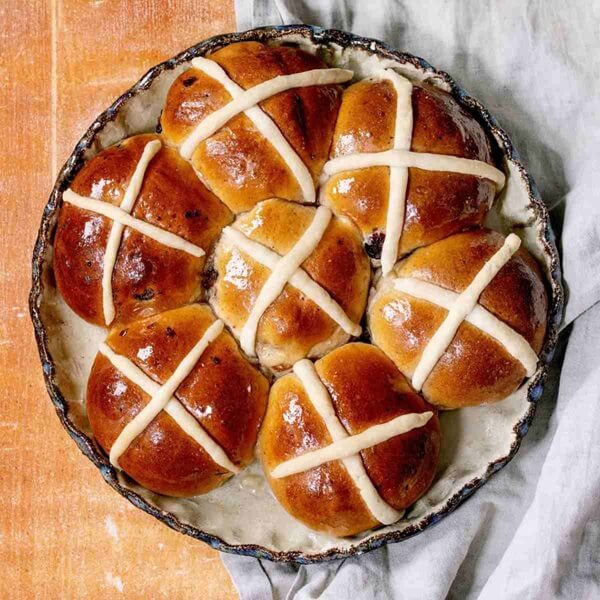National Hot Cross Bun Day is celebrated every year on September 11. Even though there’s a special day for them, hot cross buns are tasty anytime. These buns are made from sweet yeast dough and might have spices like cinnamon, along with raisins, currants, or other dried fruits. Many people enjoy hot cross buns for breakfast with coffee, warm milk, and plenty of butter. They make a delicious and satisfying breakfast.
History of National Hot Cross Bun Day
The history of National Hot Cross Bun Day includes several stories about the bun’s origins. One tale suggests that a 13th-century Anglican monk baked these buns to give to others, marking them with a cross to honor Good Friday.
Although the buns were not very flavorful back then, they symbolized friendship and love. By the 16th century, hot cross buns had made their way to Elizabethan England.
The queen decided to make the buns special and passed a law restricting their sale to Christmas, funerals, and the Friday before Easter. The law was hard to enforce and was eventually repealed, leading to people happily baking hot cross buns all year long.
Some people believed that hot cross buns had healing or magical properties. Some thought that buns baked on Good Friday would never go stale, while others believed they could keep evil spirits away or protect sailors from shipwrecks.

Although these buns may have been around before Christianity, they were traditionally eaten on Good Friday as a symbol of the crucifixion.
Today, hot cross buns are sold and enjoyed almost every day of the year, and these old superstitions have faded. Now, they’re mostly just enjoyed as a tasty treat when you’re hungry.
| 6th Century A.D. (The Greeks) | The Greeks mark their buns with a cross. |
| Early 1600s (Restriction on Sale) | James I of England tries to impose restrictions on the sale of these buns. |
| 1733 (First Definite Records) | Poor Robin’s Almanac records the Hot Cross Bun street cry. |
| 2012 (Not Cross Buns) | Buns with the same ingredients but different markings hit the market. |
Five Interesting Facts About Bread
- Storage Tip: Bread becomes stale six times faster in the fridge than if stored at room temperature.
- Eraser Trick: Soft bread crumbs were once used to erase pencil marks.
- Bread Lovers in Britain: British women eat about 76 grams of bread daily, while men consume around 113 grams each day.
- Moon Cuisine: The first meal eaten on the moon included bread and wine.
- Bread Variety: There are up to 200 different types of bread.
Cultural Significance
Hot cross buns are more than just a delicious treat; they carry significant cultural and religious symbolism. The cross on the bun is a prominent feature and represents the crucifixion of Christ.
Traditionally, the buns were eaten as part of a religious observance, and their consumption was thought to bring blessings and protection to those who partook.
In addition to their religious significance, hot cross buns have played a role in various superstitions and folk beliefs. For example, it was once believed that hot cross buns baked on Good Friday would not spoil or mold for the rest of the year and that they could be used as a charm to protect against fires and other disasters.
Over the centuries, the hot cross bun has transcended its religious origins and become a symbol of community and celebration.
Today, people enjoy hot cross buns as a delightful treat year-round, not just on religious holidays. National Hot Cross Bun Day offers an opportunity to explore this rich history and enjoy the bun’s delectable flavor.
Conclusion
In conclusion, National Hot Cross Bun Day on September 11 celebrates more than just a delicious pastry; it honors a rich tradition that spans centuries. From its humble beginnings in the 13th century to its cultural significance today, the hot cross bun has evolved from a symbol of religious observance and superstition to a beloved treat enjoyed year-round.
Whether enjoyed with a cup of coffee or savored with a pat of butter, hot cross buns offer a delightful taste of history and community. So, as you mark National Hot Cross Bun Day, take a moment to appreciate both the historical journey of this iconic bun and the simple pleasure it brings to your palate.
Frequently Ask Question
What is the historical significance of hot cross buns?
Hot cross buns have a rich history, with various stories about their origins. One tale suggests that a 13th-century Anglican monk baked them to give to others, marking them with a cross to honor Good Friday. They became popular in Elizabethan England, and a law once restricted their sale to specific occasions like Christmas and Good Friday.
Why was there a restriction on the sale of hot cross buns?
In the early 1600s, King James I of England tried to impose restrictions on the sale of hot cross buns, limiting them to Christmas, funerals, and the Friday before Easter. The law was difficult to enforce and was eventually repealed.
What were some historical beliefs about hot cross buns?
Historically, hot cross buns were believed to have magical properties. Some thought buns baked on Good Friday would never go stale, while others believed they could protect against evil spirits and shipwrecks.
How have hot cross buns evolved?
While hot cross buns were traditionally eaten on Good Friday and had religious significance, today they are enjoyed as a tasty treat throughout the year. The old superstitions have faded, and the buns are now appreciated for their flavor and historical charm.
Also read, International Bacon Day – September 7, 2024
